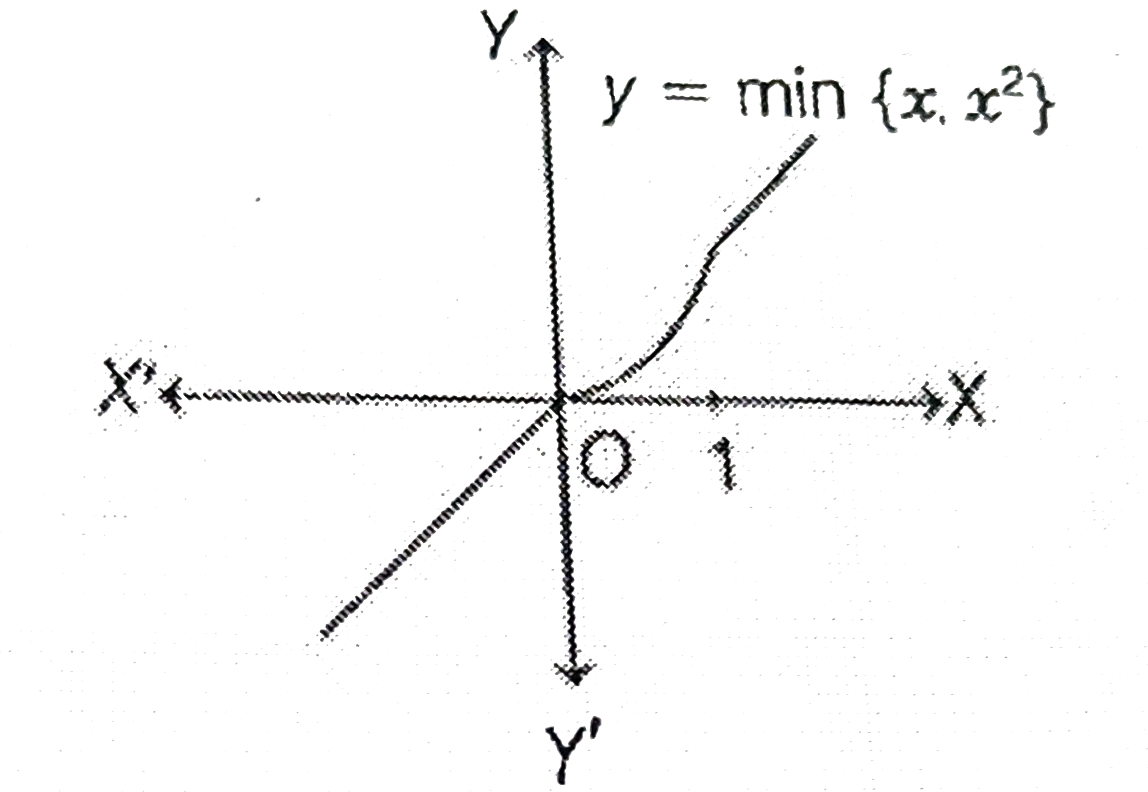Let h(x)=min{x,x2}, for every real number of X. Then (A) h is continuous for all x (B) h is differentiable for all x (C) h′(x) = 1, for all x > 1 (D) h is not differentiable at two values of x
h is continuous for all x
h is differentiable for all x
h'(x)=1,∀x>1
h is not differentiable at two values of x
The correct Answer is:A, C, D
From the figure,

h(x) is continuous all x, but h(x) is not differentiable at two points x = 0 and x = 1 . (due to sharp edges). Also h'(x)=1,∀x>1.
Hence, (a) , (c ) and (d) is correct answers.
Topper's Solved these Questions
- LIMIT,CONTINUITY AND DIFFERENTIABILITY Book:IIT JEE PREVIOUS YEARChapter:LIMIT,CONTINUITY AND DIFFERENTIABILITY Exercise:Differentiability at a point ( Assertion and Reason)
Explore 1 Video
- LIMIT,CONTINUITY AND DIFFERENTIABILITY Book:IIT JEE PREVIOUS YEARChapter:LIMIT,CONTINUITY AND DIFFERENTIABILITY Exercise:Differentiability at a point (Match the Columns)
Explore 2 Videos
- LIMIT,CONTINUITY AND DIFFERENTIABILITY Book:IIT JEE PREVIOUS YEARChapter:LIMIT,CONTINUITY AND DIFFERENTIABILITY Exercise:Differentiability at a point ( Objective Questions I)
Explore 25 Videos
- JEE MAINSBook:IIT JEE PREVIOUS YEARChapter:JEE MAINSExercise:All Questions
Explore 1 Video
- MATRICES AND DETERMINANTSBook:IIT JEE PREVIOUS YEARChapter:MATRICES AND DETERMINANTSExercise:SOLVING SYSTEM OF EQUATIONS (INTEGER ANSWER TYPE QUESTION)
Explore 2 Videos
Similar Questions
Let f be differentiable for all x, If f(1)=−2andf′(x)≥2 for all x∈[1,6], then find the range of values of f(6).
View SolutionLet f(x)={min{x,x2}x≥0max{2x,x2−1}x<0 then
(A) f(x) is continuous at x=0
(B) f(x) is differentiable at x=1
(C) f(x) is not differentiable at exactly three point
(D) f(x) is every where continuous
View Solution
Knowledge Check
Let h(x) = Min. (x,x2), for every real number x, then
Ah is discountious for all xBh is differentiable for all xCh(x) = 2, for all x<1Dh is not differentiable at two value of xLet h(x)=f(x)−(f(x))2+(f(x))3 for every real number x: Then
Ah is increasing whenever f is increasingBh is increasing whenever f is decreasingCh is decreasing whenever f is decreasingDnothing can be said in general.Let f be differentiable for all x. If f(1)=-2 and f'(x)≥2 for all x∈[1,6], then the minimum value of f(6) is
A4B2C8DNone of these
Let h(x)=f(x)−(f(x))2+(f(x))3 for every real x. Then,
View SolutionLet h(x)=f(x)−(f(x))2+(f(x))3 for every real x. Then,
View SolutionLet f be a function which is continuous and differentiable for all real x. If f(2)=−4andf'(x)≥6 for all x∈[2,4], then
View SolutionLet f(x)=|x| . Then, for all x f is continuous (b) f is differentiable for some x (c) f ' is continuous (d) f is continuous
View SolutionThe function f(x)=(sin(π[x−π])) , where [] denotes the greatest integer function, is continuous as well as differentiable for all x∈R (b) continuous for all x but not differentiable at some x (c) differentiable for all x but not continuous at some x . (d) none of these
View Solution

